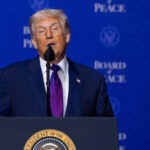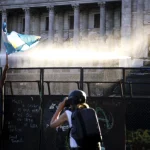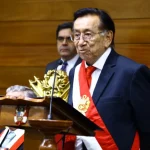By Giovani del Prete – Jan 19, 2025
The Venezuelan government is firmly committed to an international anti-fascist movement.
On January 10, 2025, Nicolás Maduro Moros took office as the constitutional president of Venezuela, renewing his government until 2031. Without unity, the opposition has sectors that have accepted the results of the election, while others allege fraud, describing the government as a dictatorship. Internationally, this picture is the same. Some governments recognize Maduro as president and others do not. As the world’s largest oil reserve and the country that has been carrying out a revolutionary political process for 26 years, Venezuela divides opinion and is a very important player in the global geopolitical chessboard.
International politics in general, and Latin America in particular, is experiencing a reality of very strong polarization between left-wing and extreme right-wing forces. As well as Venezuela, this is the case in countries like Brazil, Argentina, Chile, Colombia, Panama and Ecuador, for example. In these places, the extreme right either heads the current government, or manages to lead the opposition to the progressive government of the day, obtaining at least 40% of the voting intentions.
In general terms, this polarization is the result of the constant increase in social inequality in the overwhelming majority of countries on all continents, combined with a powerful cognitive war promoted by far-right leaders articulated with the Big Techs. Elon Musk, Mark Zuckerberg, Tim Cook, Bill Gates, Larry Page and Sergey Brin use their companies (such as Facebook, Instagram, WhatsApp, X, Alphabet, Apple, Microsoft and Amazon) to turn them into tools that profit from controlling our emotions and our way of thinking about the world. Added to this extreme right-wing club are other transnational companies such as Bunge, Cargill, Bayer, Boeing and others. They all benefit from this system of reproducing inequality and social disintegration.
It is in the wake of this polarization, combined with the election of Donald Trump, that the Venezuelan far right is seeking its place in the sun. Spreading lies and terror in the country, destabilizing the Maduro government and being accountable to its northern leaders. After all, this agenda of permanent attack, of maximum pressure against the governments of Chávez and Nicolás Maduro, has been the strategy pursued by the extremist sector of the country’s opposition, subordinate to Washington.
Like Leopoldo López, Henrique Capriles and Juan Guaidó, the duo of Maria Corina and Edmundo González have had the support of the United States, the major Western media and social networks to promote a campaign of defamation and destabilization since Chávez was elected in 1998.
Over the last 26 years, all these figures have defended the economic and diplomatic blockade, the guarimbas, the threats of military intervention and the physical and political persecution of Chavistas. As soon as Maduro’s victory was confirmed by the National Electoral Council, this fascist sector of the opposition activated the comanditos – mercenaries paid to persecute and assassinate Chavista militants -, rehearsed fake kidnappings (such as the recent alleged disappearance of Maria Corina, who minutes later went public to deny it) and began a tour of Europe, the United States and Latin America to garner support from the governments of these countries, so that they would recognize Edmundo Gonzalez as the president-elect and Maduro as dictator.
However, once again, this coup sector is failing and is heading towards dehydration. Firstly, because it lost the elections and, when it has called for mobilizations in the streets against Chavismo, the result has always been very small. Secondly, because Chavismo has been permanently mobilized in the streets and in large numbers, before, during and after the elections. Thirdly, of the almost 200 countries in the world, more than 120 have already recognized Maduro as president and the bloc of those that don’t is led by the same countries that embarked on the farce of the past, of the self-proclaimed Juan Guaidó.
With an eye on this polarized international situation, the rise of fascism and its global coordination, the Venezuelan government and its president have firmly invested in an international anti-fascist articulation, making Venezuela the country that calls on popular organizations, intellectuals and activists from all over the world – who fight for a world of peace, justice and work – to build unity in the anti-imperialist struggle and for sovereignty. Creating and strengthening national anti-fascist fronts has been Chavismo’s international response to the violent, selfish and unequal world in which we live.
Furthermore, internally, the Maduro government has given broad support to the deepening and expansion of the communes. And this is the key to all the mobilization and popular support that sustains the advance of the Bolivarian Revolution. The communes are the organizational form of territorial socialism, of building popular power from the grassroots of Venezuelan society. And this is exactly what you will hear nothing – or almost nothing – about in the media, on social networks or from a right-wing activist. Chavismo has an organized and mobilized people, while the opposition has no country project, no unity and no people.
President Maduro: Venezuela’s Economy Grows Over 9% in 2024 (+Inflation)
More than just having the largest oil reserves, Venezuela is among the world’s largest reserves of gold and biodiversity and has a privileged geographical position, which also represents a new paradigm for human relations and power in the 21st century. The communes are the building blocks of socialism in the country, embodying popular organization to work and produce, confronting and taking political power from the state bureaucracy and the ruling class to define and build their own destiny.
The quality of popular organization, the accumulation of forces by the anti-imperialist left and the alliance between the United Socialist Party of Venezuela (PSUV), the Maduro government, the Armed Forces and the police, the Communes, the militias and the Chavista militancy matters a lot. It is these social sectors that, by force of arms, support and defend the sovereignty and self-determination of the Venezuelan people. Anyone who doesn’t defend this whole project and calls themselves left-wing is either asleep, naive, cowardly or misinformed. Commune or nothing, sovereignty or nothing, socialism or nothing, left or nothing. And there are still those who are asking for electoral minutes in the midst of all this.

There are many contradictions in this process, that’s for sure. The sanctions make life difficult for the people and pave the way for corruption and destabilization. On the one hand, salaries and, on the other, the state bureaucracy – which at times hinder the progress of communal socialism – are real challenges.
With powerful global enemies and allies and with a strong strategy to strengthen popular power and socialism, the Maduro government continues with the responsibility of sustaining a political process that makes Venezuela the epicenter of the class struggle in all of Latin America.
Giovani del Prete is an activist in the Popular Brazil Movement, a member of the Continental Secretariat of ALBA Movements and a master’s student in World Political Economy (UFABC).
- Orinoco Tribune 2
- Orinoco Tribune 2
- Orinoco Tribune 2





